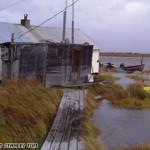Contributed by Steven Alloway, Granada Hills, CA
Warm-up Question
What would your life be like if you had extraordinary superpowers? What would you do and how would you use them? What if one day you discovered that everyone in the world had the same superpowers as you?
Expanding the Promise
Amber Case studies the interaction between humans and technology, in a field known as Cyborg Anthropology. This can include things such as prosthetic limbs and electronic implants in the brain, but more commonly deals with computers, smartphones, and other devices that people use every day.
 “A cyborg is simply someone who interacts with technology,” says Case. “The technology can be a physical or mental extension, and doesn’t need to be implanted in the person.”
“A cyborg is simply someone who interacts with technology,” says Case. “The technology can be a physical or mental extension, and doesn’t need to be implanted in the person.”
As we interact with this technology, it gives us abilities that just a few years ago were purely in the realm of science fiction, from sensors that turn lights on and off as we enter or leave a room, to camera phones that allow us to speak face to face with someone on the other side of the globe.
“A cyborg is not a Terminator or Robocop,” says Case. “Everyone that uses technology is a superhuman. It’s not so strange anymore because it’s the norm—most everyone else around us is also a superhuman.”
Discussion Questions
- What kind of technology do you use in your everyday life? What does it allow you to do?
- What can you do with technology now that you weren’t able to do five years ago? What can you do that your parents couldn’t do when they were your age?
- Are there disadvantages to this technology? What do you do when your batteries run out unexpectedly, or you’re in a place where you’re unable to connect?
Scripture Texts (NRSV) for Sunday, December 16, 2012 (Third Sunday of Advent)
(Text links are to Oremus Bible Browser. Oremus Bible Browser is not affiliated with or supported by the Evangelical Lutheran Church in America. You can find the calendar of readings for Year C at Lectionary Readings.)
For lectionary humor and insight, check the weekly comic Agnus Day.
Gospel Reflection
The Jews were God’s chosen people: the children of Abraham. He had set them apart from the rest of the world, blessing them and giving them a rich inheritance, a land flowing with milk and honey. As such, it was hard not to feel superior. But John tells the people something different. Being children of Abraham doesn’t make them superior. The Lord can raise up children of Abraham from the stones!
It seems an odd passage to study in the middle of Advent. Where’s the “peace on Earth, good will to mankind”? Instead, we get, “You brood of vipers!” and promises of axes and fires poised for the judgment. But if you look more closely, it’s actually a very appropriate passage. Advent is the preparation for the coming of the Savior. And that’s exactly what this is. John was sent to prepare the way of the Lord: to get the people ready for the beginning of Jesus’ ministry. It’s just not what we’re used to at Christmas.
Still, at its core, it’s a very hopeful passage. It’s a foreshadowing of what Jesus came to do: to take the promise given to the Jews, and open it up to everyone. To make us ALL children of Abraham, and recipients of a rich inheritance—salvation.
But that doesn’t make it easy. Though anyone can now receive the inheritance of salvation, John makes it very clear that not everyone will. Only those who bear fruit will receive the promised blessings. The rest will be cut down and thrown into the fire. So how do we bear fruit? First we must be baptized. Baptized not only with water, but with the fire of the Holy Spirit. This isn’t like the fire that will burn up the refuse that produces no fruit. Rather, this fire burns within us. Through the Holy Spirit, we are able to be “on fire” for the Lord, filled with the joy of salvation and spreading that joy, that fire, to those around us. And that’s what the coming of the Savior is all about.
Discussion Questions
- Do you tend to feel superior to the people in your life who aren’t Christians? Or do you try to spread the good news of Christ to them, so that they can have the same fire that you do?
- “Baptism by fire” is sometimes used to mean a painful or harrowing ordeal which makes us better people, once we’ve come through it. In what way has your Christian life been a “baptism by fire”? What are some difficulties you’ve had to endure for your faith, and how have they made you a better person, or a better Christian?
- What are some things that you have now, or are able to do now, that wouldn’t be possible without Christ in your life?
Activity Suggestions
Read the promise first made to Abraham in Genesis 17. Compare it to the promise in Romans 4, that we can all be children of Abraham.
Closing Prayer
Lord Jesus, thank you for the promise that you made to include us in the inheritance of Abraham. Make your Spirit burn in us, so that we may bear fruit, sharing that promise with those around us and spreading the joy of your salvation. Prepare our hearts for your unexpected coming into our lives and our world. Amen.

 A warming climate is having adverse effects on the Eskimo village of Shishmaref, Alaska. As the ice melts gradually earlier in the spring and forms later in the fall, the coast is beginning to erode—and the houses built along it are in danger of falling into the sea. One house has succumbed to the erosion already and thirteen more have been moved inland to protect them from meeting the same fate. Only one house remains—that of Shelton and Clara Koreok, only feet from the edge. Shelton refuses to move, no matter what the danger, because he fears that moving would mean losing everything he knows.
A warming climate is having adverse effects on the Eskimo village of Shishmaref, Alaska. As the ice melts gradually earlier in the spring and forms later in the fall, the coast is beginning to erode—and the houses built along it are in danger of falling into the sea. One house has succumbed to the erosion already and thirteen more have been moved inland to protect them from meeting the same fate. Only one house remains—that of Shelton and Clara Koreok, only feet from the edge. Shelton refuses to move, no matter what the danger, because he fears that moving would mean losing everything he knows.